Jumah Mohammed Abdul Latif Al Dossari is a Bahraini citizen who was held for five years at Camp Delta, at the US Naval base at Guantanamo Bay. He spent 3+1⁄2 years in solitary confinement. He was released to Saudi Arabia in 2007 with no charges against him. During the 1990s, he fought in Bosnia and Chechnya.
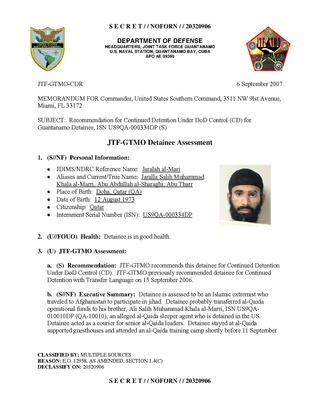
Jaralla Salih Muhammad Khala al-Marri is a citizen of Qatar and a former detainee at the United States' Guantanamo Bay detention camp in Cuba, where he was imprisoned for six and a half years. He returned to Qatar on 27 July 2008. He was reportedly born on 12 August 1973, in Doha, Qatar according to the Department of Defense.
Muhibullah or Moheb Ullah Borekzai is a citizen of Afghanistan who was held in extrajudicial detention in the United States' Guantanamo Bay detention camps, in Cuba. His Guantanamo Internment Serial Number was 546. American intelligence analysts estimate that Muhibullah was born in 1982, in Shah Wali Koot, Afghanistan.
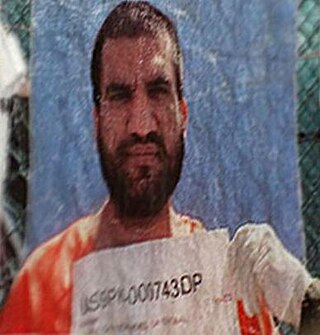
Muhammad Saad Iqbal is a Pakistani citizen who was held in extrajudicial detention in the United States Guantanamo Bay detention camps, in Cuba. Madni's Guantanamo Internment Serial Number was 743. The Department of Defense reports that he was born on October 17, 1977.
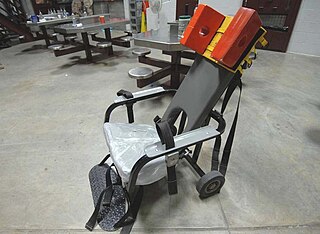
Mohammad Ahmed Abdullah Saleh Al Hanashi was a citizen of Yemen, held in extrajudicial detention in the United States Guantanamo Bay detainment camps, in Cuba. Al Hanashi's Guantanamo Internment Serial Number was 78. The Department of Defense reports that Al Hanashi was born in February 1978, in Abyan, Yemen.
Mohammed el Gharani is a citizen of Chad and native of Saudi Arabia born in 1986, in Medina. He was one of the juveniles held for seven years at the Guantanamo Bay detention camp where they estimated his age to be 15–16, though Al Jazeera reports his age to have been 14 at the time of his arrest. Human Rights lawyer Clive Stafford Smith identified el Gharani as one of a dozen teenage boys held in the adult portion of the prison.

Muhammad Ali Abdallah Muhammad Bwazir is a citizen of Yemen, once held in extrajudicial detention in the United States Guantanamo Bay detainment camps, in Cuba. Bwazir's Guantanamo Internment Serial Number was 440. American intelligence analysts estimate he was born in 1980, in Hawra', Yemen.
Abdul Rahman Ma'ath Thafir al Amri was a citizen of Saudi Arabia, held in extrajudicial detention as an enemy combatant in the United States Guantanamo Bay detainment camps, in Cuba.
The United States Department of Defense (DOD) had stopped reporting Guantanamo suicide attempts in 2002. In mid-2002 the DoD changed the way they classified suicide attempts, and enumerated them under other acts of "self-injurious behavior".
Mani Shaman Turki al-Habardi Al-Utaybi (1976 – June 10, 2006) was a citizen of Saudi Arabia, who was arrested in 2001 in Pakistan and held in extrajudicial detention in the United States Guantanamo Bay detainment camps, in Cuba from early 2002. Al-Utaybi died in custody on June 10, 2006. The Department of Defense reported his death and those of two other detainees the same day as suicides.
Ali Abdullah Ahmed, also known as Salah Ahmed al-Salami, was a citizen of Yemen who died whilst being held as an enemy combatant in the United States Guantanamo Bay detainment camps, in Cuba. His Guantanamo Internment Serial Number was 693. Joint Task Force Guantanamo counter-terror analysts estimated he was born in 1977, in Ibb, Yemen.
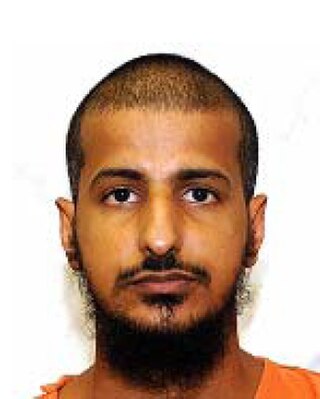
Tarek Ali Abdullah Ahmed Baada is a citizen of Yemen, who was formerly held in extrajudicial detention in the United States Guantanamo Bay detainment camps, in Cuba. His detainee ID number is 178. Joint Task Force Guantanamo counter-terrorism analysts estimated that Baada was born in 1978 in Shebwa, Yemen.
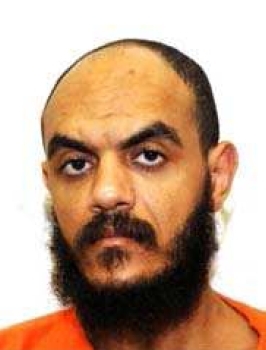
Abdul Rahman Shalabi is a citizen of Saudi Arabia held in extrajudicial detention in the United States Guantanamo Bay detention camps, in Cuba. His Guantanamo Internee Security Number is 42.

Muhammed Murdi Issa Al Zahrani is a citizen of Saudi Arabia who was held in the United States's Guantanamo Bay detention camps, in Cuba from August 5, 2002, until November 22, 2014. His Guantanamo Internment Serial Number was 713. Joint Task Force Guantanamo counter-terrorism analysts estimate he was born in 1969, in Taif, Saudi Arabia.

Sa'id Ali Jabir Al Khathim Al Shihri (1971–2013) was a Saudi Arabian deputy leader of the terrorist group Al-Qaeda in the Arabian Peninsula (AQAP), and possibly involved in the kidnappings and murders of foreigners in Yemen. Said Ali al-Shihri was captured at the Durand Line, in December 2001, and was one of the first detainees held at the Guantanamo Bay detention camps, in Cuba, arriving on 21 January 2002. He was held in extrajudicial detention in American custody for almost six years. Following his repatriation to Saudi custody he was enrolled in a rehabilitation and reintegration program. Following his release, he traveled to Yemen.

Colonel Bruce Vargo is a Military Police officer in the United States Army. He was appointed the commander of Joint Task Force Guantanamo's Joint Detention Group—its guard force from 2008 to 2009. Vargo was one of the officers interviewed for a National Geographic documentary entitled "Inside Guantanamo".
Guantanamo Bay homicide accusations were made regarding the deaths of three prisoners on June 10, 2006, at the United States Guantanamo Bay detention camp for enemy combatants at its naval base in Cuba. Two of the men had been cleared by the military for release. The United States Department of Defense (DOD) claimed their deaths at the time as suicides, although their families and the Saudi government argued against the findings, and numerous journalists have raised questions then and since. The DOD undertook an investigation by the Naval Criminal Investigative Service, published in redacted form in 2008.











